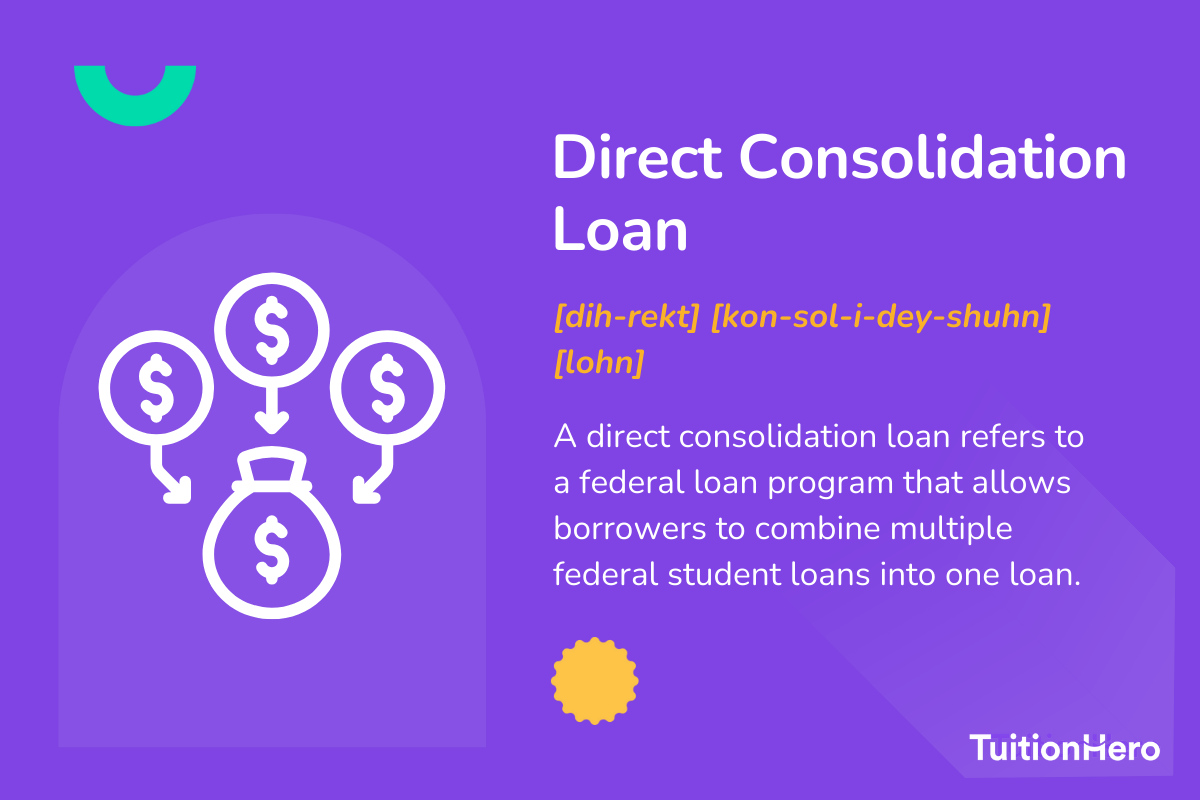Advertiser Disclosure
Last update: November 17, 2024
6 minutes read
What is a Direct Consolidation Loan?
Explore what a Direct Consolidation Loan is and how it can help simplify your multiple federal education loans. Learn more now!

By Brian Flaherty, B.A. Economics
Edited by Rachel Lauren, B.A. in Business and Political Economy
Learn more about our editorial standards



By Brian Flaherty, B.A. Economics
Edited by Rachel Lauren, B.A. in Business and Political Economy
Learn more about our editorial standards
Juggling multiple federal education loans and feeling lost? The solution may lie in understanding the inner workings of a Direct Consolidation Loan. Essentially, a Direct Consolidation Loan combines your multiple federal education loans into one single loan. This blog will share insights on the direct consolidation loan process, its advantages and disadvantages, and how it's related to loan forgiveness programs.

Key takeaways
- Direct Consolidation Loans allow borrowers to combine multiple federal education loans into one
- The interest rate on a consolidated loan is a weighted average of the rates of the original loans
- Direct Consolidation Loans are also often eligible for loan forgiveness programs, depending on whether you work in the public sector or have other circumstances
What is a direct consolidation loan?
A Direct Consolidation Loan is an arrangement that combines two or more federal education loans into a single loan. This consolidated loan comes with a fixed interest rate, determined by the weighted average of the rates on the previous loans.

How does the direct consolidation loan work?
The process of getting a Direct Consolidation Loan is managed entirely by the US Department of Education and goes through a few critical steps:
- Completion of a free application: Here, borrowers have to confirm the loans they intend to consolidate and agree to repay the new consolidated loan.
- Consolidation of selected loans: The selected loans are combined into a new direct consolidation loan.
- Managing your repayment: You will now have to make a single monthly payment instead of multiple payments on different loans.
Remember that most federal loans are eligible for this process. However, private loans can't be consolidated into this new loan, though they can often be consolidated into a single private loan with your current lender.
How can direct consolidation loans improve monthly payments?
One of the big attractions of Direct Consolidation Loans is the possibility of a lower monthly payment. When you merge multiple loans into one, you aren't just reducing the hassle of multiple payments. It can make your repayment obligation easier in two major ways:
- Extended repayment terms: Borrowers may be eligible for repayment terms of up to 30 years. This longer duration might reduce the monthly payment amount.
- One monthly payment: No need to remember multiple due dates. Just one single due date for the one loan you now owe.
What loan forgiveness options are available?
If you choose a Direct Consolidation Loan, you might qualify for loan forgiveness programs. These programs can relieve you of repaying part or all of your student loan.
Common forgiveness programs include the Teacher Loan Forgiveness Program and the Public Service Loan Forgiveness (PSLF) program. Importantly, forgiven student loan amounts aren't usually considered taxable income in many states, meaning you don't have to pay income tax on the canceled amount. Some states may have exceptions, so check your state's laws.
Although the Biden administration's plan to forgive significant student loan debt was canceled by the Supreme Court, the White House introduced the innovative Saving on a Valuable Education (SAVE) Plan.
This plan offers features like lower monthly payments for undergraduate borrowers. You pay a percentage of your income (5% for undergraduate loans) instead of the traditional interest and principal.
The best part? Any remaining amount is forgiven after 20 years of payments.
What are the repayment options offered?
Direct Consolidation Loans extend the possibility of unique repayment options, making it way more flexible compared to multiple unconsolidated loans. These include:
- The Standard Repayment Plan
- The Graduated Repayment Plan
- The Extended Repayment Plan
- The Saving on a Valuable Education (SAVE) Plan
- The Pay as You Earn (PAYE) Plan.
- The Income-Based Repayment (IBR) Plan
- The Income-Contingent Repayment (ICR) Plan
These plans offer different benefits and suit different financial situations. For instance, the SAVE plan sets monthly payments at an affordable $0 for single borrowers earning less than $32,800 per year. If you’re low-income or not earning anything, this income-driven repayment plan is the best option for you.
What factors should be considered prior to consolidation?
Before you consolidate loans, consider the benefits associated with the original loans:
- Beware of increased interest: Since the interest rate on the consolidated loan is a weighted average of the rates on the previous loans, it might possibly be higher than the rate on some of the previous loans.
- Loss of benefits: Once consolidated, you might lose benefits like interest rate discounts, rebates, or forgiveness calculations associated with the original loans.
- Immediate repayment: Consolidating your loans means saying goodbye to the grace period. Generally, your first payment would be due in about 60 days after the consolidation.
Compare private student loans now
TuitionHero simplifies your student loan decision, with multiple top loans side-by-side.
Compare Rates
Dos and don’ts of direct consolidation loans
As you consider Direct Consolidation Loans, it's essential to understand some key actions to take and actions to avoid. Let’s see an overview of these key points.
Do
Assess current and future financial state
Apply for loan consolidation for free
Leverage loan forgiveness benefits
Evaluate the impact of consolidation on interest rates
Don't
Ignore the potential loss of certain benefits
Rush into extending the repayment period
Forget the potential increase in overall interest paid
Consolidate if you'll only get a small decrease in monthly payments
Advantages and disadvantages of direct consolidation loans
Direct Consolidation Loans can be an attractive option for many people, but it's crucial to perform a comprehensive analysis, taking into account both the advantages and disadvantages.
- Lower monthly payments: Extending the repayment term when consolidating can result in lower monthly payments.
- Access to loan forgiveness options: You can access loan forgiveness programs such as Teacher Loan Forgiveness and Public Service Loan Forgiveness.
- Different repayment options: Multiple repayment options, like the Standard, Graduated, or Extended repayment plan, give borrowers flexibility.
- Fixed interest rate: The interest rate is generally fixed and could be lower than the rates of previous variable loans.
- More interest over the life of the loan: Because consolidation typically extends the repayment period, you may end up paying more in the long run.
- Loss of grace period: The repayment period starts immediately upon consolidation and does not have a grace period.
- Loss of certain benefits: Consolidation may result in the loss of benefits from the original loans like interest rate discounts and rebates.
- Prior loan payments don’t count toward loan forgiveness requirements: You'll need to start from scratch to meet the requirements for loan forgiveness.

Why trust TuitionHero
Are you confused about federal loans and looking for a solution? At TuitionHero, we help students and parents navigate college financing challenges. We offer guidance on interest rates, repayment options, and consolidation processes, along with services like Private Student Loans, Refinancing, Scholarships, FAFSA Assistance, and Credit Card Offers. Our goal is to empower you with choice and control over your college journey.
Frequently asked questions (FAQ)
No, Direct Consolidation Loans only allow you to consolidate federal education loans. You'll need to explore other options for private student loan consolidation.
Consolidating your federal loans through the Direct Consolidation Loan program does not require a credit check, so it won't hurt your credit score. In fact, it could potentially improve your credit score by making it easier to keep making on-time loan payments.
You can apply for a Direct Consolidation Loan once you complete school, withdraw from school, or fall below half-time student status. It's important to consider the potential loss of certain benefits before rushing into the process.
After consolidation, you'll no longer owe payments on the original loans. Instead, you'll have a single, new consolidated loan to pay. Your repayment period will start immediately, and the first payment is usually due about 60 days after the consolidation.
Final thoughts
Understanding college finances doesn't need to be hard. Direct Consolidation Loans can make things easier, giving you control over your financial future. It's not the best choice for everyone, but if you have multiple federal education loans, it can help simplify things.
Consider your financial situation, future goals, and loan terms to make the best decision for you. And don't forget that TuitionHero is here to help you with tools and expertise for all your college finance questions.
Sources
Author

Brian Flaherty
Brian is a graduate of the University of Virginia where he earned a B.A. in Economics. After graduation, Brian spent four years working at a wealth management firm advising high-net-worth investors and institutions. During his time there, he passed the rigorous Series 65 exam and rose to a high-level strategy position.
Editor

Rachel Lauren
Rachel Lauren is the co-founder and COO of Debbie, a tech startup that offers an app to help people pay off their credit card debt for good through rewards and behavioral psychology. She was previously a venture capital investor at BDMI, as well as an equity research analyst at Credit Suisse.
At TuitionHero, we're not just passionate about our work - we take immense pride in it. Our dedicated team of writers diligently follows strict editorial standards, ensuring that every piece of content we publish is accurate, current, and highly valuable. We don't just strive for quality; we aim for excellence.
Related posts
While you're at it, here are some other college finance-related blog posts you might be interested in.
Shop and compare student financing options - 100% free!

Always free, always fast
TuitionHero is 100% free to use. Here, you can instantly view and compare multiple top lenders side-by-side.

Won’t affect credit score
Don’t worry – checking your rates with TuitionHero never impacts your credit score!

Safe and secure
We take your information's security seriously. We apply industry best practices to ensure your data is safe.
Finished scrolling? Start saving & find your private student loan rate today
Compare Personalized Rates




